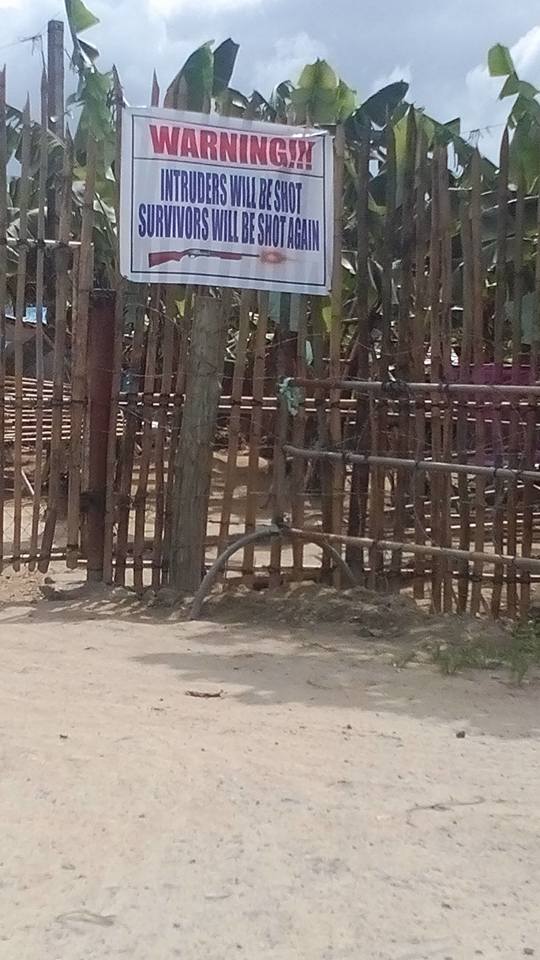
Photo from Facebook
“Intruders will be shot, survivors will be shot again”
Thus warned a tarpaulin sign put up at the wooden gates of a banana plantation in Madaum, Tagum City in Davao del Norte. Private security guards of Lapanday Foods Corporation (LFC) manning the gates are also making rounds to keep the “intruders” and “survivors” out.
A few weeks before Christmas, the so-called “intruders” faced these armed guards in daring protests – they successfully occupied the land but not before ten of them were shot and wounded by Lapanday. On New Year’s Eve, while the rest of the world drowned in revelry, the farmers of Madaum were violently driven away from their own land.
The rightful owners of the land – members of the Madaum Agrarian Reform Beneficiaries Association, Inc (MARBAI), now affiliated with the Unyon ng mga Manggagawa sa Agrikultura (UMA) through their local union, Unyon sa mga Mag-Uuma Alang Sa Tinood Nga Repormang Agraryo (UGMAD –TRA or Farmers’ Union For Genuine Agrarian Reform) – are forbidden by Lapanday to till the land already awarded to them by government land reform.
Violent land disputes continue to hound agricultural workers 30 years after the Mendiola Massacre. On January 22, 1987, 13 farmers were killed right before Malacanang gates in a peasant march calling for land reform.
Because of the carnage, the peace talks – then ongoing between the government and the National Democratic Front (NDF) representing the Communist Party of the Philippines (CPP) and its armed wing, the New People’s Army (NPA) – collapsed.
Then-President Corazon Aquino, heiress of controversial sugar estate Hacienda Luisita, soon enacted the Comprehensive Agrarian Reform Program (CARP), the effectivity of which expired 26 years after in 2014, during the term of her son, Benigno Aquino III.
Still, unrest persists in Luisita and Lapanday areas in Mindanao. This reflects the brutality of feudal land monopoly in the Philippines which no government land reform law has ever resolved. But under Duterte, the next round of peace talks between government and NDF will resume today in Rome.
“Those who joined the rally in Mendiola 30 years ago aspired for change through genuine agrarian reform, but the CARP has obviously failed our farmers and agricultural workers,” says Danilo Ramos, UMA Secretary General.
“Land reform should be the meat of the next phase of the talks, with a serious and thorough discussion of the country’s fundamental land problem and the forging of a comprehensive agreement on Socio-Economic Reforms (CASER).
Non-stop abuses by Cojuangco-Aquinos, Lorenzos
Thirty years after Mendiola, the Cojuangco-Aquinos of Luisita and their new business partners, the Lorenzos of Lapanday, seem to be on a roll – non-stop and hell-bent in trampling upon the rights of peasants and agricultural workers from Tagum to Bukidnon to Tarlac.
The CARP has allowed for anomalous non-land transfer schemes such as the Stock Distribution Option (SDO) implemented in Luisita, and various Agribusiness Venture Arrangements (AVAs) such as the lease agreement with agrarian reform beneficiaries imposed by Lapanday in Madaum.
In Luisita, hacienderos are still in control of vast tracts of land even after so-called “land distribution” through the aryendo or illicit leaseback practiced by Agrikulto, Inc. and Central Azucarera de Tarlac (CAT), firms owned by the Cojuangco-Aquinos and Lorenzos.
Agrikulto engages in sugarcane farming through aryendo or lease of farmlots in land reform areas to ensure the steady supply of cane for the CAT sugar mill. Only last week, it was revealed that Agrikulto “hired” via human trafficking around 1,000 sacadas or migratory sugar workers from Mindanao to cut and haul cane. The sakadas were given slave-like wages while working in deplorable conditions.
Sakadas from Bukidnon “rescued” by UMA and its local affiliate OGYON, have already filed labor complaints against their recruiters and employers.
But the landlords have no qualms in using brute force. Yesterday, in an act of bitter reprisal, farmhuts were demolished and crops were destroyed in Barangay Mapalacsiao, Hacienda Luisita by dozens of goons led by a known Cojuangco-Aquino aide, Lourdes Barangay Captain Edison Diaz, assisted by a certain Sgt. Bañaga of the local police.
The huts are within the bungkalan or land cultivation area of the local farmworkers organization, Alyansa ng Manggagawang Bukid sa Asyenda Luisita (AMBALA), also an affiliate of UMA. Diaz, who is directly involved in previous violent incidents against farmers, is also a known broker of the illicit aryendo or leaseback deals for the landlords.
“It is no surprise that farmers in Madaum have already sought the assistance of the Communist Party’s ‘people’s court’ to hear their case. Until powerful people like the Cojuangcos, Aquinos and Lorenzos are made to pay for their atrocities, feudal oppression will continue to push peasants to join the armed struggle waged by the NPA,” said Ramos.
UMA believes that the issue of land reform in Luisita, the plight of the sakada, and the monopoly control of powerful families and multinationals over vast agricultural plantations and haciendas especially in Negros and Mindanao, must be decisively tackled during the ongoing peace talks.
“There can be no justice for victims of Mendiola, no genuine peace to be had until the country’s fundamental land problem is addressed,” ended Ramos.